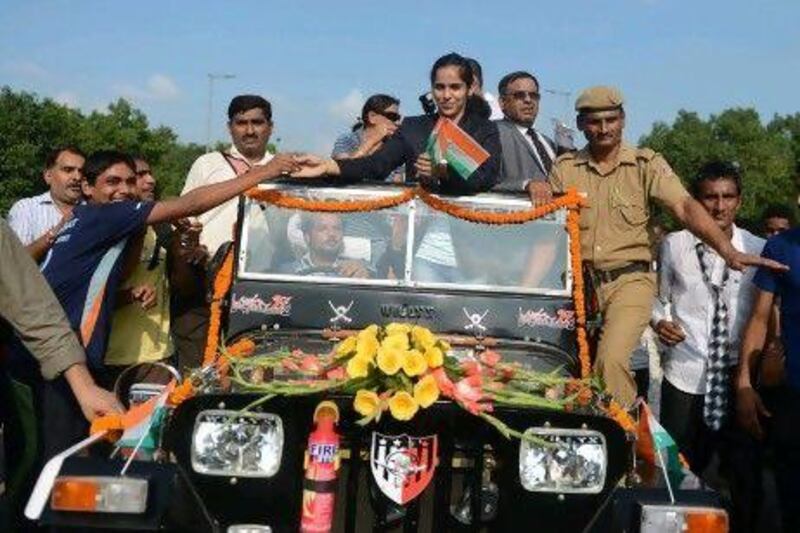India returned with two silver and four bronze medals from the London 2012 Olympics. But there could have been a gold too, had "lack of ambition" been an Olympic sport.
Celebration has not stopped since 81 athletes returned with those six medals, the country's biggest Olympics haul, equalling the collective tally of India's previous seven campaigns in the quadrennial event.
Cash awards and promotion have been showered on the medallists shuttling from one felicitation ceremony to another, extending the kind of reception reserved otherwise for India's pampered cricketers.
None of the self-congratulation, however, can gloss over the fact that the world's second-most-populous nation languishes at the bottom of the medals-per-capita table featuring 85 nations that had at least one athlete on the podium in London.
While the London haul is testimonial to the improvement India has made in recent times, the nonstop celebration suggests the country of 1.2 billion people set the bar low for itself.
Pranab Mukherjee, the president, was among those who struck this note.
"Six medals was a good harvest. However, a nation of 1.2 billion should do better. India deserves a position higher than No 55," Mukherjee said as he hosted the Indian medal winners at his residence a few weeks ago.
Starved of significant Olympic success, India remains mired in nostalgia over its hockey heyday, which yielded eight gold medals from 1928-1980.
The shooter Abhinav Bindra won India's first individual gold in the 2008 Beijing Olympics, where the country won two bronze as well before heading to London where the number of medals doubled.
"It will be only fair to say that India has just arrived," said Randhir Singh, secretary general of the Indian Olympic Association (IOA).
"We have doubled the number (of medals) from Beijing and it would only go up. It takes eight-nine gold to be in the top 10 and by 2020, India should be in the top 10," said Singh, also the secretary of the Olympic Council of Asia.
>>>
A lack of ambition is not the issue, argues the sports historian Boria Majumdar.
"I'm against this whole cynical view that a nation of 1.2 billion managed just six medals in contrast to China's 88," said Majumdar, who has co-authored: Olympics: The India Story - a comprehensive book on India's Olympic campaigns from 1928.
"It's very simplistic. Yes, it's a country of 1.2 billion but how many have access to sports? India never had a proper sports culture and there are so many issues.
"Make no mistake, London was a watershed moment for India and it's time to emerge as a multi-sport nation that plays not just cricket."
Majumdar lists what ailed Indian sports before Beijing.
"We lacked a sports culture, there was an acute lack of funds and sports was never a priority for the government.
"The way forward is to concentrate in sports where we have better chance. Here you need to follow the Chinese model. Funding should continue and India's target should be to double the tally in 2016 Rio and win 20 medals in 2020."
Money clearly mattered. More so in a country where cricket gobbles up much of the corporate patronage while other sports survive largely on government largesse.
India spent US$121.7 million (Dh447m) to train athletes for the 2010 Commonwealth Games in Delhi and even though the event proved a $6 billion public-relations disaster following a tumultuous build-up, the hosts came up with their best performance to finish second in the medals table.
"During our preparation for the Commonwealth Games in Delhi, we had long camps and there was a lot of foreign exposure," Yogeshwar Dutt, who won the 60kg freestyle wrestling bronze in London, wrote in the Hindustan Times. "It was because of this that we performed exceedingly well in 2010."
Further proof of that improvement came the following month at the Asian Games in Guanzhou, China, where India finished sixth, its best ever finish in the event.
>>>
The government allotted $46.7m for the athletes' preparation for London and Singh said India would keep improving if funds were not an issue.
"The government is spending tremendous amount of money and taking sports seriously. If that continues, there is no limit to what we can do," said Singh, a former Olympic shooter.
"Take the case of Australia, they spent a lot and did so well. Now they have stopped spending and finished just in the top 10.
"There can't be a comparison with China. They have been spending generously for a long time. We've just started.
"You saw the result in London and you'd see how we perform in the Asian Games and Commonwealth Games in 2014 and the 2016 Rio Olympics. The graph would only go up."
Singh said India would focus more on disciplines that suit them but would not abandon others.
"We have won medals in wrestling, boxing, shooting and badminton in London. We have great chance in archery and weightlifting as well. So if we focus on these sports, we'd do well.
"At the same time, you can't become a sports power competing in a handful of disciplines. Some sports would stand out but we have to try and win medal in as many disciplines as possible.
"From whatever I have seen, we should do well in sports like rowing and sailing. Also fencing - we have a great tradition of fencing. I have great hopes from our throwers as well."
Follow us
[ @SprtNationalUAE ]





